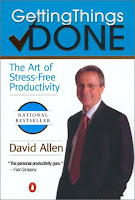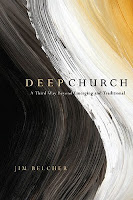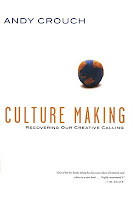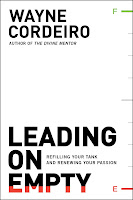One of the most important questions I am asked as a pastor is how to understand the relationship between God's grace and our effort in living the Christian life. We know that we are supposed to walk in the power of the Spirit. But what does this look like?
Some forms of spirituality promote an unhealthy passivity in their approach to sanctification, by using such slogans as "Let go and let God" or "It's not in trying, it's in trusting." (Note: for an excellent historical overview and charitable critique of one significant stream of this teaching, see
Andy Naselli's book
Let Go and Let God: A Survey and Analysis of Keswick Theology.) Even among Reformed thinkers, who are rightly allergic to an overemphasis on moral effort that obscures the primacy of God's grace, there lurks the danger of speaking about the role of the gospel (or grace, or the Spirit) in sanctification in ways that mute biblical exhortations like "walk," "fight," and "run".
I'm working on a book that will address some of these concerns, called
Active Spirituality, which will be published by
Shepherd Press in 2012 or 2013. But here is a sampling of quotes from theologians across the centuries who seem to get the biblical balance right.
“Give me the grace to do as you command, and command me to do what you will! . . . when your commands are obeyed, it is from you that we receive the power to obey them.” --Augustine,
Confessions, Book X, Chap. 31.
"There can be no doubt...that the beginning of our salvation rests with God, and is enacted neither through us nor with us. The consent and the work, however, though not originating from us, nevertheless are not without us... What was begun by grace alone, is completed by grace and free choice together, in such a way that the contribute to each new achievement not singly, but jointly; not by turns, but simultaneously. It is not as if grace did one half of the work and free choice the other, but each does the whole work, according to its own peculiar contribution. Grace does the whole work, and so does free choice - with this one qualification: that whereas the whole is done in free choice, so the whole is done of grace. --Bernard of Clairvaux,
De gratia, 14.46-47; Quoted in Dennis E. Tamburello,
Union with Christ: John Calvin and the Mysticism of St. Bernard, p. 42.
"Our duty and God's grace are nowhere opposed in the matter of sanctification, yeah, the one doth absolutely suppose the other. Neither can we perform our duty herein without the grace of God; nor doth God give us this grace unto any other end but that we may rightly perform our duty. He that shall deny either that God commands us to be holy in a way of duty, or promiseth to work holiness in us in a way of grace, may with as much modesty reject the whole Bible." --John Owen, "A Discourse Concerning the Holy Spirit," in
Works of John Owen, Volume 3, p. 384.
"In efficacious grace we are not merely passive, nor yet does God do some, and we do the rest. But God does all, and we do all. God produces all, and we act all. For that is what he produces, viz. our own acts. God is the only proper author and fountain; we are the only proper actors. We are, in different respects, wholly passive, and wholly active." --Jonathan Edwards, "On Efficacious Grace," in
The Works of Jonathan Edwards, Volume 2, p. 557.
"In the gospel...there are actually no demands and no conditions. For God supplies what he demands. Christ has accomplished everything, and though he did not accomplish rebirth, faith, and repentance in our place, he did acquire them for us, and the Holy Spirit therefore applies them. Still, in its administration by Christ, the covenant of grace does assume this demanding conditional form. The purpose is to acknowledge humans in their capacity as rational and moral beings; still, though they are fallen, to treat them as having been created in God's image; and also on this supremely important level, where it concerns their eternal weal and eternal woe, to hold them responsible and inexcusable; and, finally, to cause them to enter consciously and freely into this covenant and to break their covenant with sin. The covenant of grace, accordingly, is unilateral: it proceeds from God; he has designed it and defined it. He maintains and implements it. It is a work of the triune God and is totally completed among the three Persons themselves. But it is destined to become bilateral, to be consciously and voluntarily accepted and kept by humans in the power of God... The covenant of grace does not deaden human beings or treat them as inanimate objects. On the contrary, it totally includes them with all their faculties and powers, in soul and body, for time and eternity. It embraces them totally, does not destroy their power, but deprives them of their impotence. IT does not kill their will but frees them from sin; it does not numb their consciousness but delivers it from darkness. It re-creates the whole person and, having renewed it by grace, prompts it, freely and independently, with soul, mind, and body, to love God and to dedicate itself to him." --Herman Bavinck,
Reformed Dogmatics: Sin and Salvation in Christ, Volume 3, p. 230.
“God’s work in salvation, in Paul’s view, never absorbs or invalidates man’s work, but arouses and stimulates it and gives it meaning.” --G. C. Berkouwer,
Faith and Sanctification, p. 122.
"Passivity, which quietists think liberates the Spirit, actually resists and quenches him. Souls that cultivate passivity do not thrive, but waste away. The Christian's motto should not be 'Let go and let God' but 'Trust God and get going!'" --J. I. Packer,
Keep in Step with the Spirit, p. 157.
"Therefore, my beloved, as you have always obeyed, so now, not only as in my presence but much more in my absence, work out your own salvation with fear and trembling, for it is God who works in you, both to will and to work for his good pleasure." --The Apostle Paul, Philippians 2:12-13




















